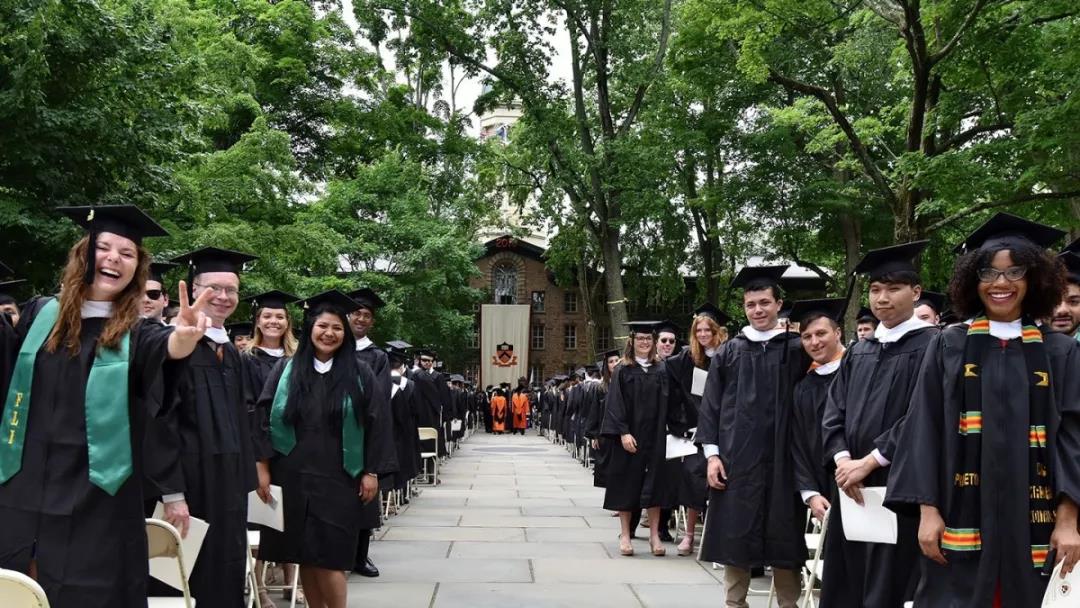以藤校为代表,每年美国大学的毕业典礼都会受到许多人的关注。其中在毕业演讲环节,嘉宾和校长致辞更会金句频出,从而引发广泛的讨论。
今天这篇文章,棒小编就准备了美国名校:普林斯顿大学的2019年毕业演讲。通过校长或政要名流的娓娓道来,相信您会对“教育是以终为始”这句话有更为深刻的理解。
“这是一个对待分歧缺少礼貌和尊重的时代,人们更喜欢挑衅或谴责对手,而不是参与重要的公民事务。公民美德要求我们尊重他人,而不只关注自己。”
——校长Christopher L. Eisgruber
Christopher指出这是一个脾气暴躁的时代,无论是对于政要名流,亦或是偶然进入公众视野的小人物,都有遭受网络暴力的可能性,且这些暴力指控被长久地镌刻在互联网的数字世界里。
而一个有序的公民社会不应该是这样的,公共事件的参与者应该具有公平、包容多方利益和观点的能力。

从普林斯顿毕业的学生都怀有一颗仁者的心,有能力,能够建设性的参与到激烈的分歧中。Christopher 提议为了调整改善这浮躁失序的社会,学生们需要共同学习进步,追求公益,并在不同维度相互团结,为公民美德代言。
In a few minutes, all of you will march through FitzRandolph Gate as newly minted graduates of this University. Before you do, it is traditional for the University president to say a few words about the path that lies ahead.
This valedictory ritual is at once utterly common and manifestly artificial. If I or other speakers had sage insight into the wisdom required to navigate life’s unpredictable and sometimes tragic challenges, I guarantee you that we would have shared it long before now. That, I suspect, is one reason why most graduation speeches, with rare and glittering exceptions, are little noted when delivered and quickly forgotten thereafter.
And if the ritual graduation speech is artificial under any circumstances, it seems all the more so at the conclusion of a reunions and commencement weekend when political contention occasionally flared amidst the academic calendar’s most joyous festivities and celebrations. These local events reflect the mood of the country and indeed much of the world. Ours is an ill-tempered time, one that leads some thoughtful observers to worry that we as a country are losing the capacity to disagree respectfully and civilly with one another.
Bitter scrutiny is now almost inevitable for anyone who voluntarily enters public life, and increasingly it extends also to some who never sought the world’s attention. People just going about their lives, doing hard jobs or making tough choices as conscientiously as they can, may suddenly find themselves caught in an unwanted spotlight, the target of unproven and hurtful accusations permanently inscribed on the internet’s digital surfaces.
Even school children on a field trip may find themselves consumed by our fevered animosities. Earlier this spring, Covington Catholic High School students interacted with a Native American man at the Lincoln Memorial. A video of the encounter went viral, and the internet made the young boys international symbols of bigotry and racial insensitivity. When a more complete and complex story emerged, the students’ defenders rushed, with some justification but too much glee, to condemn those who had circulated the original video before they knew all the facts. Nobody involved emerged unscathed. This unhappy chain of events began, ironically, in the shadow of a national monument inscribed with counsel frequently quoted but rarely heeded in our society: “With malice toward none, with charity for all …”
The firestorm generated by the confrontation at the Lincoln Memorial was especially intense but the basic pattern is all too familiar. Our politics has become hostage to an angry and accusatory culture, in which people too often prefer to issue provocations or denounce opponents, rather than engage in the vital civic work required by deliberative processes that are fair and inclusive to multiple interests and points of view.
Many observers have speculated about the sources of our anger, but I will leave the analysis of causation for another time. I want instead to focus on a reason for hope about society’s future, and your own.
Although the angriest people in our society may be the most noticeable, I am confident that they are not the most numerous. Most people aspire to treat others decently, not to denounce them. I have gotten to know many of you over your time here, and I know that you have the capacity and the values required to engage constructively across even very heated disagreements.
So, while I cannot pretend to have any magical guidance to prepare or protect you for the path that lies ahead, there is one piece of advice that I hazard to offer as you leave this campus: you are moving into a world in which civic norms crucial to our shared political life are fraying. Your generation’s ability to address the world’s problems will depend on, among other things, your capacity to nurture and repair those norms. If ever there was a time when quiet, everyday virtues such as civility, truthfulness, due process, and moderation could be taken for granted, that day is gone.
These civil virtues are neither glamorous nor exciting. They require us to respect others rather than draw attention to ourselves. They are quiet rather than dazzling. Yet, quiet though they may be, these virtues are also the indispensable foundation for any democratic society in which people seek to learn from one another and to pursue a common good that unites them across differences. If you want a society that has the capacity to make real and lasting progress on issues of consequence, you will need not only to live those values but also to speak up bravely on their behalf.
Your education at this University, in its classrooms and beyond them, has given you the resources to defend the civil virtues and to provide the service, citizenship, and leadership that our world so needs. I urge you to take up that challenge along with the others that await you on the path beyond FitzRandolph Gate. As you begin that journey, all of us on this platform wish you well. Whether you receive today a doctoral degree, a master’s degree, or an undergraduate degree, we hope that you will return often to Old Nassau and consider this campus one of your homes. We will welcome you then as we cheer you today, wishing you every success as Princeton University’s GREAT CLASS OF 2019!! CONGRATULATIONS AND BEST WISHES!




